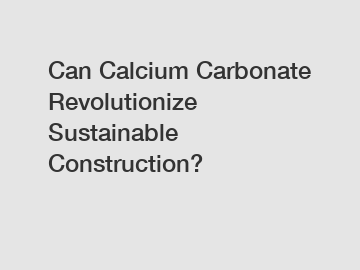Can Calcium Carbonate Revolutionize Sustainable Construction?
In recent years, the construction industry has been facing an urgent need to shift towards sustainable practices. With the increasing environmental concerns, finding alternative materials that can reduce carbon emissions and enhance energy efficiency has become crucial. One such material that has gained significant attention is calcium carbonate. Its unique properties and versatile applications make it a promising candidate to revolutionize sustainable construction. In this blog, we will explore the potential of calcium carbonate in transforming the construction landscape and its role in achieving a greener and more sustainable future.
1. Calcium Carbonate: An Eco-Friendly Building Block:
Calcium carbonate is a naturally occurring compound found in abundance in various forms, such as limestone, marble, and chalk. Due to its inherent characteristics, it can be harnessed as a sustainable alternative to conventional construction materials. Firstly, calcium carbonate is widely available and easily accessible, minimizing the need for extensive extraction processes. Additionally, its production results in significantly lower carbon emissions compared to commonly used alternatives like cement. This eco-friendly nature makes calcium carbonate a prime contender for sustainable construction practices.

2. Enhancing Energy Efficiency with Calcium Carbonate:
Buildings account for a substantial portion of global energy consumption, making energy efficiency a crucial aspect of sustainable construction. Calcium carbonate can play a vital role in this pursuit by improving the insulation properties of building materials. When incorporated into products like concrete, calcium carbonate enhances thermal resistance, reducing heat transfer and subsequently lowering energy usage for both heating and cooling purposes. This energy-saving potential makes it an excellent choice for green buildings aiming to minimize their carbon footprint.
3. Carbon Capture and Utilization:
As we strive to combat climate change, one important aspect is capturing and utilizing carbon emissions. Calcium carbonate offers a unique advantage in this regard. Through a process called mineral carbonation, carbon dioxide can be chemically reacted with calcium carbonate, resulting in the formation of stable carbonates that can be used in construction materials. By capturing and storing carbon dioxide in this way, calcium carbonate aids in reducing atmospheric greenhouse gas levels while providing a valuable resource for the construction industry.
4. Strengthening Materials, Reducing Waste:
Another noteworthy attribute of calcium carbonate is its ability to strengthen various materials, enhancing their durability and longevity. When used as an additive in concrete, it improves its compressive strength, reducing the risk of cracks and structural failures. This increased strength decreases the need for frequent repairs or replacements, hence reducing waste generation. Additionally, it can be utilized to recycle industrial waste materials like slag, fly ash, or even plastic waste, further promoting the circular economy and minimizing environmental impact.
5. Aesthetic Appeal and Versatile Applications:
Calcium carbonate's applications are not limited to enhancing sustainability; it also offers aesthetic value to architectural designs. Its use in producing eco-friendly and visually appealing finishes for walls, floors, and facades has gained popularity. Due to its light-reflecting properties, surfaces with calcium carbonate finishes create a brighter and more welcoming environment, reducing the need for excessive artificial lighting. Furthermore, calcium carbonate can be finely ground and used as a natural pigment in paints and coatings, reducing the dependence on synthetic and potentially harmful alternatives.
Conclusion:
As the urgency to prioritize sustainability grows, the construction industry must embrace innovative materials that reduce environmental impact without compromising structural integrity. Calcium carbonate stands out as a game-changer in sustainable construction due to its eco-friendly nature, ability to enhance energy efficiency, contribute to carbon capture and utilization, strengthen materials, and offer versatile aesthetic applications. By harnessing its potential, we can pave the way for a greener and more sustainable future, revolutionizing the construction industry one building at a time.
Are you interested in learning more about Volcanic Mud Powder price, yellow sodium bentonite in bulk, Light Calcium Carbonate wholesale? Contact us today to secure an expert consultation!


